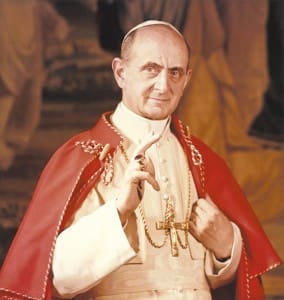Atlanta
Looking Back… June 1963
Published June 20, 2013
The June 13, 1963 edition of The Georgia Bulletin carried a front-page question and answer interview with Cardinal Augustine Bea, head of the Vatican Secretariat for Christian Unity. The cardinal had visited the United States in April 1963 and had a fresh look at the ecumenical movement in the U.S. The interview was copyrighted because of its exceptional exchange between questions asked by Atlanta Archbishop Paul J. Hallinan and answers written by Cardinal Bea. The cardinal wrote that the ecumenical climate in the United States “has improved in an absolutely surprising manner.” “In the United States … one feels that there has been something of an explosion” of interest in ecumenism, he said. Because there is such a large number of Christian denominations in the United States “the extreme intensity of the division makes more clearly apparent all the absurdity of the division itself and spurs on the search for a remedy,” Cardinal Bea said.
The June 20 edition included a news story on the murder of Medgar Evers and the response by Bishop Richard Gerow of Natchez-Jackson, Miss., to the fatal shooting of the civil rights leader outside Evers’ home. Bishop Gerow, leader of about 67,000 Catholics among Mississippi’s population of 2.1 million, said, “The assassination of Medgar Evers is certainly a shocking and saddening occurrence in our community and is more meaningful than the death of one man. I personally extend my heartfelt sympathy to the wife and children of Mr. Evers, and convey to them my blessing and the assurance of my prayers.” The bishop said “the grave racial situation” is “unmistakably a moral (problem)” and added that “the murder of Mr. Evers and the other instances of violence in our community tragically must be shared by all of us. Responsible leadership … has been singularly lacking,” he said. The bishop continued, saying, “I beseech our leaders and men of good will of both races to find some common ground on which to build a civic order based on human dignity and the concept of justice under God’s law. Rights which have been given to all men by the Creator cannot be the subject of conferral or refusal by men.” Although the Evers were Methodist, two of the Evers’ children attended Catholic school in Jackson, Miss., the news report said. The bishop went to the funeral home to extend his condolences to Evers’ widow, Myrlie. The first Mississippi field secretary of the National Association for the Advancement of Colored People, Evers was 37 years old when he was assassinated on June 12, 1963. (Byron De La Beckwith was convicted of the killing in 1994 and died in 2001.)
The June 27, 1963, issue celebrated the election of Pope Paul VI to the papacy. Eighty members of the College of Cardinals were sealed in the Sistine Chapel on Wednesday, June 19, to begin the selection of the prelate to succeed Pope John XXIII. Some 42 hours after the conclave began, “the telltale plume of white smoke rose from the thin stovepipe which had been erected above the chapel to inform the waiting world of the election.” Cardinal Giovanni Battista Montini, archbishop of Milan, Italy, stepped out onto the balcony at St. Peter’s Basilica as pope, choosing the name Paul VI. In tracing his biography, the news story reported that Pope Pius XII wanted to elevate him to the rank of cardinal in 1953, but he asked so insistently to be allowed to decline that the pope permitted it. In 1954 he was named archbishop of Milan and in 1958 Pope John XXIII chose him to be a cardinal. This time he did not refuse, entering into the College of Cardinals from which he was elected pope.
In a pastoral letter read at all Masses, the bishop of Savannah announced that all Catholic schools in the Savannah Diocese would be integrated as of Sept. 1, 1963. Bishop Thomas J. McDonough said as of that date “Catholic children, regardless of race or color, will be admitted to Catholic schoo
ls of the Diocese of Savannah.” He said he had studied the matter for two years, prayed constantly and met with priests and teachers across the diocese. “They have concurred unanimously with my decision,” he said. “In you, my dear people, I repose in greatest confidence that you will accept this course of action as being prompted by a love of God founded upon justice and charity towards all mankind.” The news story reported that there were nine Catholic elementary schools and three Catholic high schools in Chatham County (Savannah) with a total of 4,000 students. Three of the elementary schools and one of the high schools had been segregated for black students only, and 1,000 students were enrolled.
